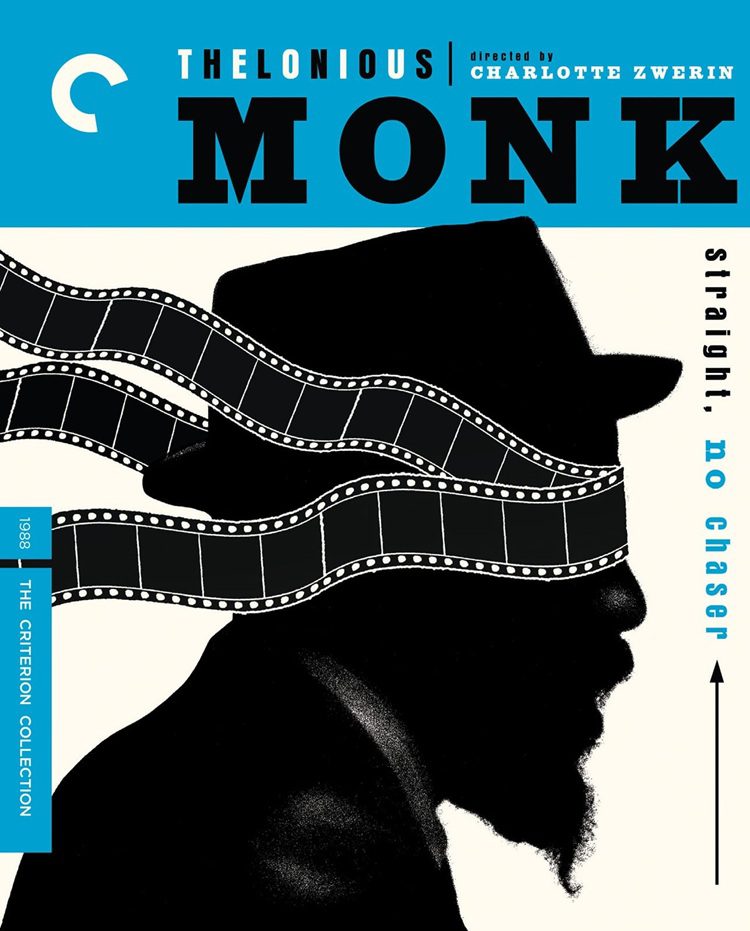
Thelonious Monk: Straight, No Chaser is a documentary directed by Charlotte Zwerin about the famed jazz musician/composer. She was brought onto the project after producer Bruce Ricker learned that brothers Christian and Michael Blackwood had followed Monk for six months, accumulating 13 hours of film for the purpose of creating a one-hour special for West German public television in 1967. Using the Blackwoods’ footage, other archival material, and new interviews of those close to Monk, including his son, Thelonious Monk Jr,; tenor saxophonist Charlie Rouse, who played in his band, and his manager Harry Colomby, Zwerin creates a fascinating profile of an enigmatic man.
Buy Thelonious Monk: Straight, No Chaser (Criterion Collection) Blu-rayRather than finding him at the piano, the film opens with Monk spinning on stage while his band plays and then he walks off. It appears he is caught up in the performance, but after hearing some speak about his mental issues later in the film, it seems there could have been more going on with him in the moment. Returning to the bench, he strikes the keys in his distinctive style, tapping his foot in time, humming along.
Monk’s early history is presented as he moved from North Carolina with his mother and family to New York. He studied at Julliard but “his real teachers” were jazz pianists Fats Waller, Art Tatum, and Duke Ellington. He became the house piano player at Minton’s Playhouse, where he, Charlie Parker, Dizzy Gillespie played a new wave of jazz: bebop. Colomby states “Blacks who were listening to that music saw an expression of independence and pride and strength…[because] the musicians weren’t obviously trying to please an audience, but they were playing their music their way.”
Throughout the film, there are clips of Monk playing in various arrangements on stage and in a studio: solo, with his quartet, and with his octet. The musicians he assembled play in sync with him whether standards or his compositions, and he reveals himself to be a talented player and composer.
Monk Jr. reveals the difficulties growing up with his father due to the bipolar mood swings he experienced, which would some times lead to Monk being hospitalized for days. Colomby talks about Monk’s peculiar ways that they would try to mask when around others. This behavior is on display throughout. The viewer sees his trouble communicating, such as when he wants the engineer to play back the band’s rehearsal but he has to be repeatedly told it wasn’t recorded. In one scene, after spinning around, he acknowledges that other people behaving like him would end up in a straitjacket. Luckily, he had his wife Nellie to look out for him and guide him.
At one point, Monk just lost interest in music and stopped playing. Unfortunately, there’s no insight from him about his work or his struggles, but considering what he dealt with, he may not have been able to, leaving the the work to speak for itself.
The video was given a 1080p/MPEG-4 AVC encoded transfer displayed at an aspect ratio of 1.33:1. The liner notes state, “this new 4K restoration was created from a 35mm blowup interpositive.” The archival material, mostly in black and white, some taken from TV appearances, naturally vary in quality in all aspects. From the richness of blacks, to the sharpness of focus, to the amount of film grain, to the strength of the light sources, all are different from one sequence to the next. Dirt and debris my appear. The modern-day interviews are in color and exhibit better texture detail.
The audio is available in LPCM Mono. Also from the notes, “the monaural soundtrack was remastered from the original six-track 35mm DME magnetic track.” Culled from various sources, the music, which sounds quite good, comes from recordings and live performances so the clarity and loudness fluctuates. Dialogue comes from controlled interview settings and capturing people on the fly. The track doesn’t suffer from hiss or signs of age and damage.
The Special Features are:
- Charlotte Zwerin, 2003 (5 min) – In June 2003, a retrospective of her work was presented by the Museum of Modern Art. In this video introduction made when the retrospective traveled to the Harvard Film Archive, she talks about how she got involved in documentary film.
- Charlotte Zwerin: Director, Editor, Innovator (29 min) – A new program about Zwerin and her contributions to the Direct Cinema movement
- T.S. Monk (25 min) – Monk’s son speaks about his father and the film.
- Trailer
As the title indicates, Thelonious Monk: Straight, No Chaser presents the man as he was. It’s a shame living was so hard for him, but that may have been what shaped his talents. The film is a compelling look at the man and his music. The historical significance of the material overrides the condition its in, making it a worthy addition to the Criterion Collection.